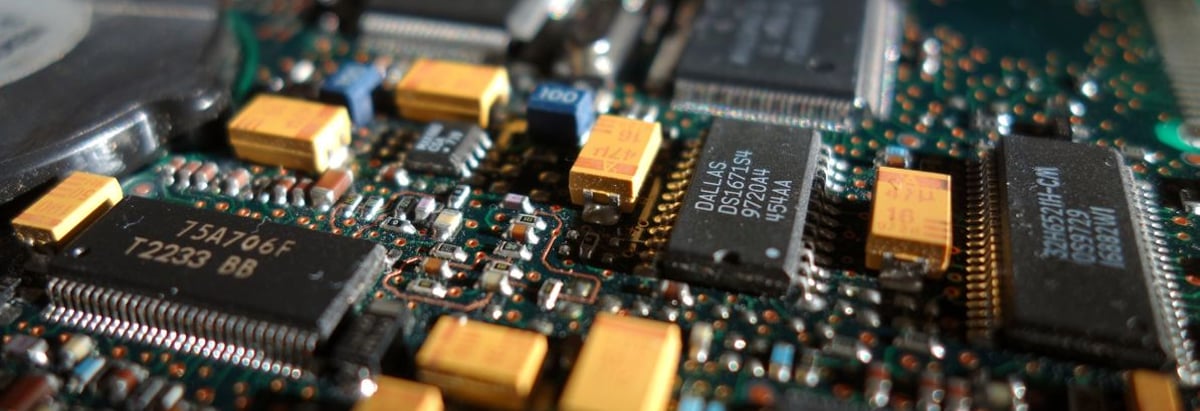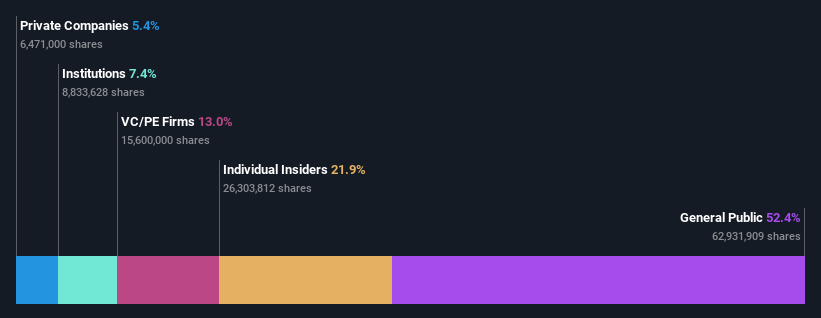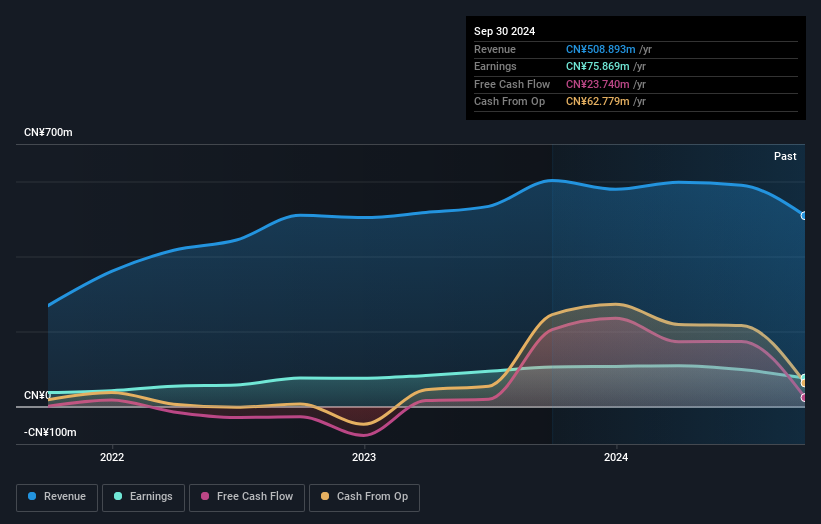- China
- /
- Semiconductors
- /
- SHSE:688589
Leaguer (Shenzhen) Microelectronics Corp.'s (SHSE:688589) market cap rose CN¥356m last week; individual investors who hold 52% profited and so did insiders

Key Insights
- Leaguer (Shenzhen) Microelectronics' significant individual investors ownership suggests that the key decisions are influenced by shareholders from the larger public
- A total of 25 investors have a majority stake in the company with 47% ownership
- 22% of Leaguer (Shenzhen) Microelectronics is held by insiders
Every investor in Leaguer (Shenzhen) Microelectronics Corp. (SHSE:688589) should be aware of the most powerful shareholder groups. We can see that individual investors own the lion's share in the company with 52% ownership. Put another way, the group faces the maximum upside potential (or downside risk).
Individual investors gained the most after market cap touched CN¥3.6b last week, while insiders who own 22% also benefitted.
In the chart below, we zoom in on the different ownership groups of Leaguer (Shenzhen) Microelectronics.
See our latest analysis for Leaguer (Shenzhen) Microelectronics

What Does The Institutional Ownership Tell Us About Leaguer (Shenzhen) Microelectronics?
Institutions typically measure themselves against a benchmark when reporting to their own investors, so they often become more enthusiastic about a stock once it's included in a major index. We would expect most companies to have some institutions on the register, especially if they are growing.
We can see that Leaguer (Shenzhen) Microelectronics does have institutional investors; and they hold a good portion of the company's stock. This suggests some credibility amongst professional investors. But we can't rely on that fact alone since institutions make bad investments sometimes, just like everyone does. If multiple institutions change their view on a stock at the same time, you could see the share price drop fast. It's therefore worth looking at Leaguer (Shenzhen) Microelectronics' earnings history below. Of course, the future is what really matters.

Hedge funds don't have many shares in Leaguer (Shenzhen) Microelectronics. Leaguer Group Co., Ltd. is currently the company's largest shareholder with 13% of shares outstanding. Meanwhile, the second and third largest shareholders, hold 8.3% and 4.9%, of the shares outstanding, respectively. Kun Liu, who is the second-largest shareholder, also happens to hold the title of Chief Executive Officer.
Our studies suggest that the top 25 shareholders collectively control less than half of the company's shares, meaning that the company's shares are widely disseminated and there is no dominant shareholder.
While studying institutional ownership for a company can add value to your research, it is also a good practice to research analyst recommendations to get a deeper understand of a stock's expected performance. Our information suggests that there isn't any analyst coverage of the stock, so it is probably little known.
Insider Ownership Of Leaguer (Shenzhen) Microelectronics
The definition of company insiders can be subjective and does vary between jurisdictions. Our data reflects individual insiders, capturing board members at the very least. The company management answer to the board and the latter should represent the interests of shareholders. Notably, sometimes top-level managers are on the board themselves.
Insider ownership is positive when it signals leadership are thinking like the true owners of the company. However, high insider ownership can also give immense power to a small group within the company. This can be negative in some circumstances.
Our most recent data indicates that insiders own a reasonable proportion of Leaguer (Shenzhen) Microelectronics Corp.. Insiders have a CN¥790m stake in this CN¥3.6b business. We would say this shows alignment with shareholders, but it is worth noting that the company is still quite small; some insiders may have founded the business. You can click here to see if those insiders have been buying or selling.
General Public Ownership
The general public, mostly comprising of individual investors, collectively holds 52% of Leaguer (Shenzhen) Microelectronics shares. With this amount of ownership, retail investors can collectively play a role in decisions that affect shareholder returns, such as dividend policies and the appointment of directors. They can also exercise the power to vote on acquisitions or mergers that may not improve profitability.
Private Equity Ownership
With a stake of 13%, private equity firms could influence the Leaguer (Shenzhen) Microelectronics board. Some investors might be encouraged by this, since private equity are sometimes able to encourage strategies that help the market see the value in the company. Alternatively, those holders might be exiting the investment after taking it public.
Private Company Ownership
It seems that Private Companies own 5.4%, of the Leaguer (Shenzhen) Microelectronics stock. It's hard to draw any conclusions from this fact alone, so its worth looking into who owns those private companies. Sometimes insiders or other related parties have an interest in shares in a public company through a separate private company.
Next Steps:
While it is well worth considering the different groups that own a company, there are other factors that are even more important. Consider for instance, the ever-present spectre of investment risk. We've identified 2 warning signs with Leaguer (Shenzhen) Microelectronics , and understanding them should be part of your investment process.
Of course, you might find a fantastic investment by looking elsewhere. So take a peek at this free list of interesting companies.
NB: Figures in this article are calculated using data from the last twelve months, which refer to the 12-month period ending on the last date of the month the financial statement is dated. This may not be consistent with full year annual report figures.
New: AI Stock Screener & Alerts
Our new AI Stock Screener scans the market every day to uncover opportunities.
• Dividend Powerhouses (3%+ Yield)
• Undervalued Small Caps with Insider Buying
• High growth Tech and AI Companies
Or build your own from over 50 metrics.
Have feedback on this article? Concerned about the content? Get in touch with us directly. Alternatively, email editorial-team (at) simplywallst.com.
This article by Simply Wall St is general in nature. We provide commentary based on historical data and analyst forecasts only using an unbiased methodology and our articles are not intended to be financial advice. It does not constitute a recommendation to buy or sell any stock, and does not take account of your objectives, or your financial situation. We aim to bring you long-term focused analysis driven by fundamental data. Note that our analysis may not factor in the latest price-sensitive company announcements or qualitative material. Simply Wall St has no position in any stocks mentioned.
About SHSE:688589
Leaguer (Shenzhen) Microelectronics
A fabless chip design company, engages in the designs, develops, and sells integrated circuits, computer software, and electronic information products.
Adequate balance sheet and slightly overvalued.
Market Insights
Community Narratives


